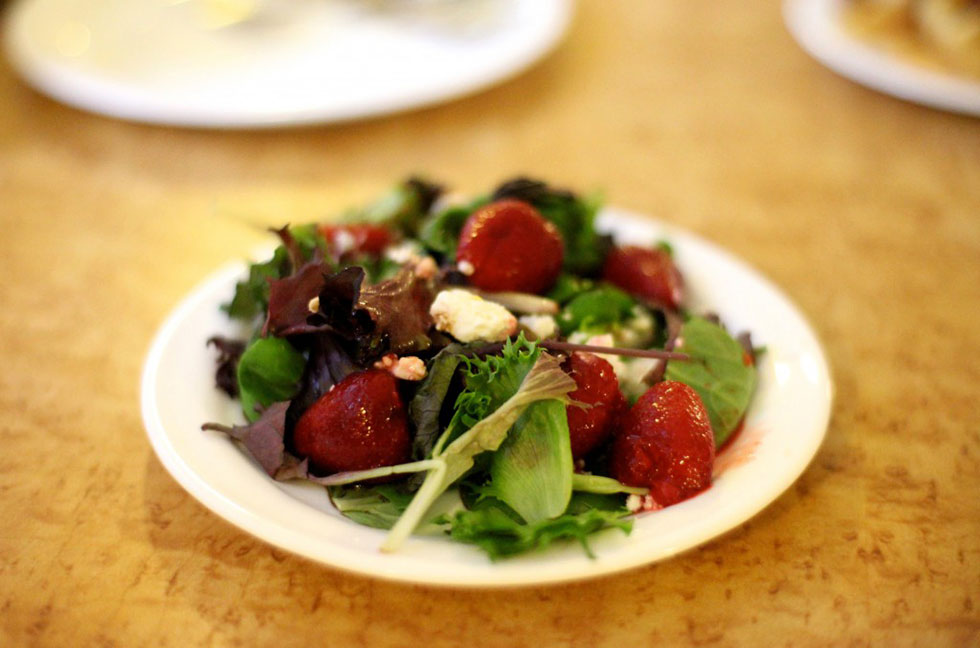The “freshman fifteen” is not a new concept among college students today. Freshmen and upperclassmen alike have to battle the temptation to overeat junk food while trying to carve out time for exercise. Robyn Flipse, Nutrition Consultant and Registered Dietitian, wrote the book Fighting the Freshman Fifteen which offers tips in the dining halls, portion sizes, managing stress eating and fifty easy recipes for your dorm room. In an interview with Flipse, we got the scoop on what to do to avoid gaining those infamous fifteen pounds freshman year.

Photo by Anna Beckerman
What should students take advantage of or avoid in all-you-can-eat dining halls?
“One of the things that I really think is an issue with today’s students in that there’s a lot of choice. It’s like a buffet every time you go down to the cafeteria to eat, and I think people get overwhelmed.”
Since her book was written in 2002 before the explosion of smart phones, Twitter and Instagram, Flipse offers some updated advice: Instagram your food.
“Students should take a photo of their food, and if they would be willing to share it on Instagram, then it might be a good model to prevent our impulse decisions. It would give you a sense of consciousness of what’s on that tray to see if you overloaded it with carbs and don’t have enough vegetables. I do not believe college students don’t know what a balanced died looks like. It’s something they can identify if they were asked to write it down. The idea of a photo or Instagram post that you feel is good enough to share may help.”
She also says students should make sure to fill up on fruits and veggies:
“A gap for all students is getting enough fruits and vegetables. They fill you up, provide a lot of fiber and don’t have a lot of excess calories. Nude produce-any form of produce without dressings or sauces, if worth piling up on your plate.”
What are good snack options while studying late at night?
“Part of the reason people keep eating late into the night is that they are trying to keep themselves awake. It helps to have snacks around that satisfy you, but aren’t so high in calories. Mini boxes of cereal or packets of oatmeal are good options. When you have a dorm refrigerator you can keep 6 oz. containers of yogurts, cottage cheese or tuna. Hard boiled eggs are great as well.”

Photo by Rachel Ferreira
What are your favorite easy recipes out of the 50 in your book?
“I got a feeling that college kids go to school with a blender or something of the sort. The blender that everybody brings poses one big problem: you have to have a lot of fresh fruits to make smoothies, and nobody has them.”
We all love smoothies, but Flipse is right. Fresh fruit goes bad quickly, so it’s hard to keep enough around to make our own. One of the recipes in her books requires ingredients that last longer and are easier to keep in your dorm room. It’s called the Nut Butter Blend:
“If you have some kind of milk or yogurt, peanut butter and some honey, you can make a simple smoothie. Basically it’s a peanut butter drink that is a little sweet from the honey and has extra protein from the milk or yogurt. Those ingredients are easy to keep around rather than fresh fruits and veggies. But, if you happen to have a banana laying around, throw it in. It’s a great fallback recipe for just about any time of the day.”
The second one is called a BBQ Sammie.
“This one gives you a lot of bang for your buck in terms of flavor. The problem with snacking is that our taste buds are searching for something to wake them up. If you have canned chicken chunks, combine that with BBQ sauce, spicy mustard, relish, ketchup, or just about any packet of sauce and mix it up. You can make a sandwich or a wrap out of this, and it tastes a little better than plain chicken and even more interesting than plain mayonnaise. It doesn’t taste like a pulled pork sandwich or a great BBQ sandwich, but it’s easy to have packets of sauce around so that you can make any basic food taste a little better. Even on crackers, it’s a little more interesting.”
Overall, Flipse wants the main focus of healthy eating to be about being conscious of what we are eating, our portions and, of course, eating lots of fruits and vegetables. The freshman fifteen doesn’t have to happen to you, especially if you follow some of these tips and tricks.

